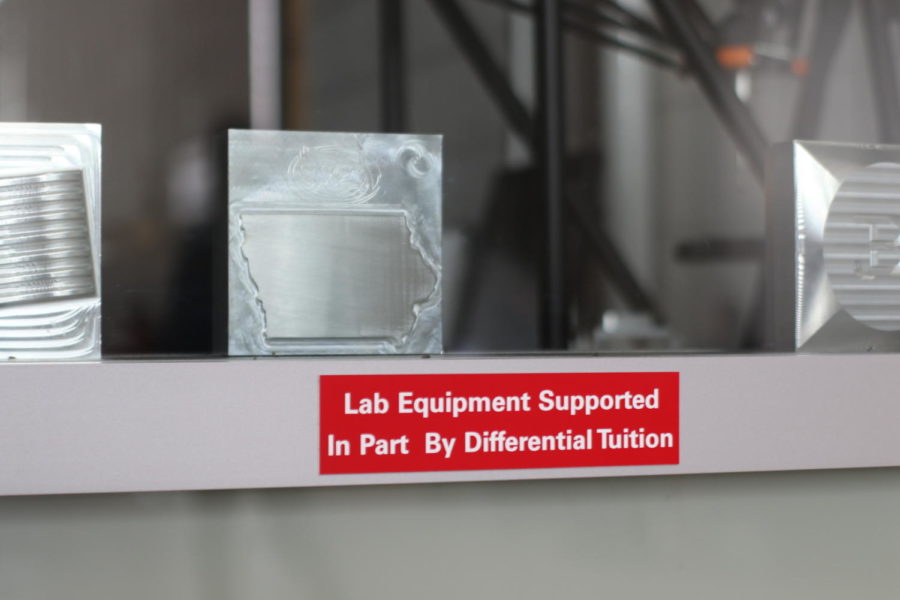How differential tuition affects Iowa state students
January 10, 2018
At Iowa State, different students across different colleges, majors and classification may possibly pay higher tuition costs than others based on what they’re studying. This is called differential tuition.
Currently two colleges at Iowa State, business and engineering, use differential tuition across their majors. Select majors in the College of Agriculture and Life Sciences and the College of Liberal Arts and Sciences also pay differential tuition.
The reason this exists is due to the variance in the cost of instruction in these programs which includes “salaries and direct instructional costs, administration, student services, library and technology access, facilities and operations, and equipment,” said Senior Vice President and Provost Jonathan Wickert.
“Iowa State has established differential tuition rates to align costs where they are actually incurred, rather than spreading those costs over the entire student population,” Wickert said.
Wickert cited lab-based and studio-based instruction and simulation-based learning as some experiential learning components can lead to varied costs as well.
For some of these programs, differential tuition has been assessed for a number of years. In the College of Engineering, differential tuition was approved by the Board of Regents to be implemented beginning in the summer of 2006. The College of Business’ differential tuition proposal was approved in December 2008.
But the academic year of 2017 saw an expansion of differential tuition to a number of new programs. Here is a breakdown for who pays differential tuition in each college. The rates will vary by residency, level of study and major.
College of Agriculture and Life Sciences
For the College of Agriculture and Life Sciences, 10 majors pay differential tuition. These majors are: animal ecology, animal science, agricultural systems technology, biology, dairy science, forestry, general pre-veterinary medicine, genetics, industrial technology and microbiology.
After a student hits 60 credits is normally when the higher rates take effect. For the 2017-18 academic year these students will pay $267 more than the base tuition each semester. That amount will increase to $533 in 2018-19 and to $800 in 2019-20.
College of Business
In the College of Business, all students who are in the professional business program with 60 or more credits pay differential tuition. In the 2016-17 academic year, this meant these students paid $877 per semester above the base tuition at Iowa State.
College of Design
Only architecture majors in the College of Design pay differential tuition. It begins upon entry into the program.
College of Engineering
All junior and senior engineering students with 60 or more credits pay differential tuition. Differential tuition has been fully phased in since the 2009-10 academic year in the college. The differential rate is adjusted annually as the base tuition rate is adjusted.
College of Liberal Arts and Sciences
This is the first academic year any majors within the College of Liberal Arts and Sciences have used differential tuition.
The majors affected are biology, biological/pre-medical illustration (BPMI) or pre-BPMI, computer science and genetics.
Students in these majors who came directly to Iowa State from high school and have completed 60 or more credits must pay differential tuition. The rates will be phased in over three years and will be the same amount as the College of Agriculture and Life Sciences.
For students who are having to pay more based on their major, the extra tuition payment goes to tangible improvements colleges have been able to make because of this money.
“Revenue from differential tuition supports the hiring and retention of faculty, modernization of laboratory equipment and instructional technology, renovation and renewal of instructional facilities, equipment and lab supplies, and related expenses needed to maintain high quality programs – the core of the university,” Wickert said.
According to the College of Business, differential tuition has led to a decrease in average undergraduate class size by 18 percent over four years. Since implementation, 14 new faculty have been hired.
The 2017-18 academic year is the first year many majors are using differential tuition, so it will take time to see the results.
“Not saying it’s the right way or the best way, but it’s had proven results,” said Vice President Cody Smith about differential tuition at a Student Government town hall in October.
Wickert said the university is considering differential tuition for more programs within the colleges of design, human sciences, agriculture and life sciences and liberal arts and sciences. The university is also considering changes to the existing rates in the colleges of business and engineering.
Iowa State’s FY2019 tuition proposal will be submitted to the Board of Regents soon and discussed at the board’s meeting in February.
“Consistent with past practice, we suggest that the new differential tuition rates be phased in, and implemented with transparent communication and engagement with students,” Wickert said.
















